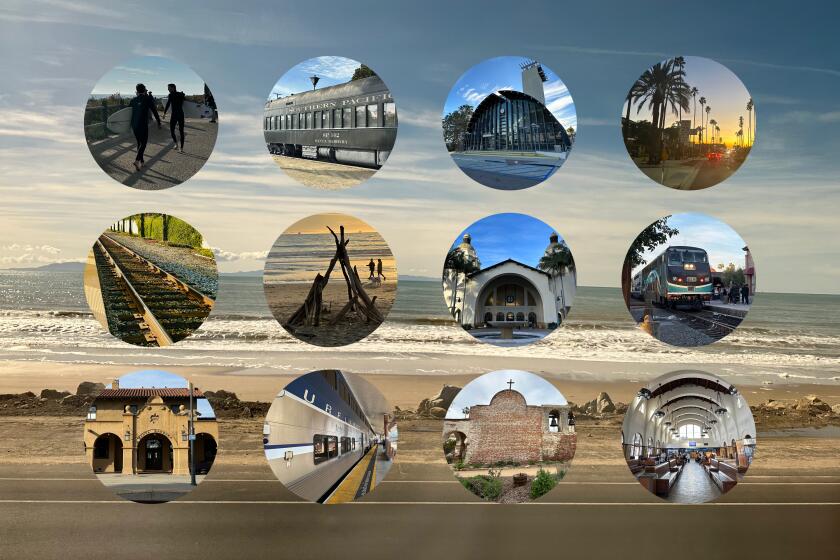Do We Need Big Biz to Bankroll Parks?
Most Americans haven’t heard of the government’s plan to commercialize the national parks. To the few who have, it seems like proof that we have gone much too far with our national experiment in shifting from public to private responsibility.
The park proposal is not an invitation for corporations to plaster their logos across Half Dome, the Lincoln Memorial or the Grand Canyon. Rather, it is an opportunity for 10 or so selected companies to contribute around $15 million apiece each year to the national parks. In return, the companies can use in their advertising a special symbol--like the Olympic rings--to proclaim themselves “official sponsors” of the national park system. Under the National Parks Commercialization Act, corporate logos would not appear within the parks.
The sponsorship millions certainly could be put to good use. Annual budgets for our 369 national parks, memorials, battlefields, historic sites and recreation areas have been cut by more than $200 million since 1983, while the number of visitors in that time has increased 30%, from 207 million to 270 million a year. For lack of funds, some campgrounds had to be closed this summer, and there were 900 fewer park rangers. Research programs have stopped. Paint is peeling. Roads are potholed. The Park Service says it would take $4 billion to catch up with all the postponed maintenance.
There is precedence for the private sector paying for what the government will not do. In 1986, corporations contributed to a $300-million drive to refurbish the Statue of Liberty and Ellis Island. In a burst of ads, the companies took credit for the restored Miss Liberty.
That experience engendered plenty of criticism. The essence of charity is anonymity, some said. If you have to brag about it--especially if you spend more bragging about it than you gave in the first place--that isn’t charity, it’s marketing. Furthermore, it’s marketing based on false claims. The corporate contributions (and ads) were tax-deductible, so in fact they were taken from taxpayers’ hides. And twice as much money was contributed by individuals and fraternal, ethnic and community groups as by corporations.
The bill in Congress aims to turn sporadic infusions of corporate money into regular practice. In the current plan, companies will cover only 8% of the Park Service’s annual budget. But one only has to contemplate the Olympics to imagine a slippery slope that could carry the parks into a commercial swamp. There may be a soul somewhere who believes that the Golden Arches or Mickey Mouse will not follow the money into the parks, but there is no such innocence in the advertising world.
There are, of course, other ways to fund the national parks.
In most cases, entrance fees haven’t gone up since the parks were established. There is another bill before Congress that would not only allow parks to raise fees (a car entering Yellowstone, for example, might pay not $10 but $25), but also would let each park keep the money instead of, as at present, passing it to the general Treasury.
Greater sums could also come from park concessions. More than 650 private companies earn a total of $700 million a year operating campgrounds, restaurants, hotels and other enterprises in the parks. They pay $19 million a year for their monopoly licenses, which are granted for 10 to 30 years and are usually renewed automatically. Here’s a place where market principles could benefit our parks. But bills to open park concessions to competitive bidding passed Congress overwhelmingly last year only to be held back by the Republican leadership, so they never reached the president for signature.
Another way to pay for the parks is--shocking thought!--through our taxes. Doubling the current $1.5-billion National Park Service operating budget would cost $5 per American per year--call it $15 per family. If we, the least-taxed people in the industrialized world, feel too poor to raise our taxes that much, we could get the money by building one less B-2 bomber.
Generations of Americans poorer than we somehow managed to maintain the parks, commonly owned, commonly supported. We inherited them, the crown jewels of our citizenship. Is there really something different about us, something less wise, something weaker or cheaper or meaner, that prevents us from passing to our children these beautiful lands, well-kept, publicly supported, refuges from the commercialism that dominates every other part of our world?
Sign up for The Wild
We’ll help you find the best places to hike, bike and run, as well as the perfect silent spots for meditation and yoga.
You may occasionally receive promotional content from the Los Angeles Times.



